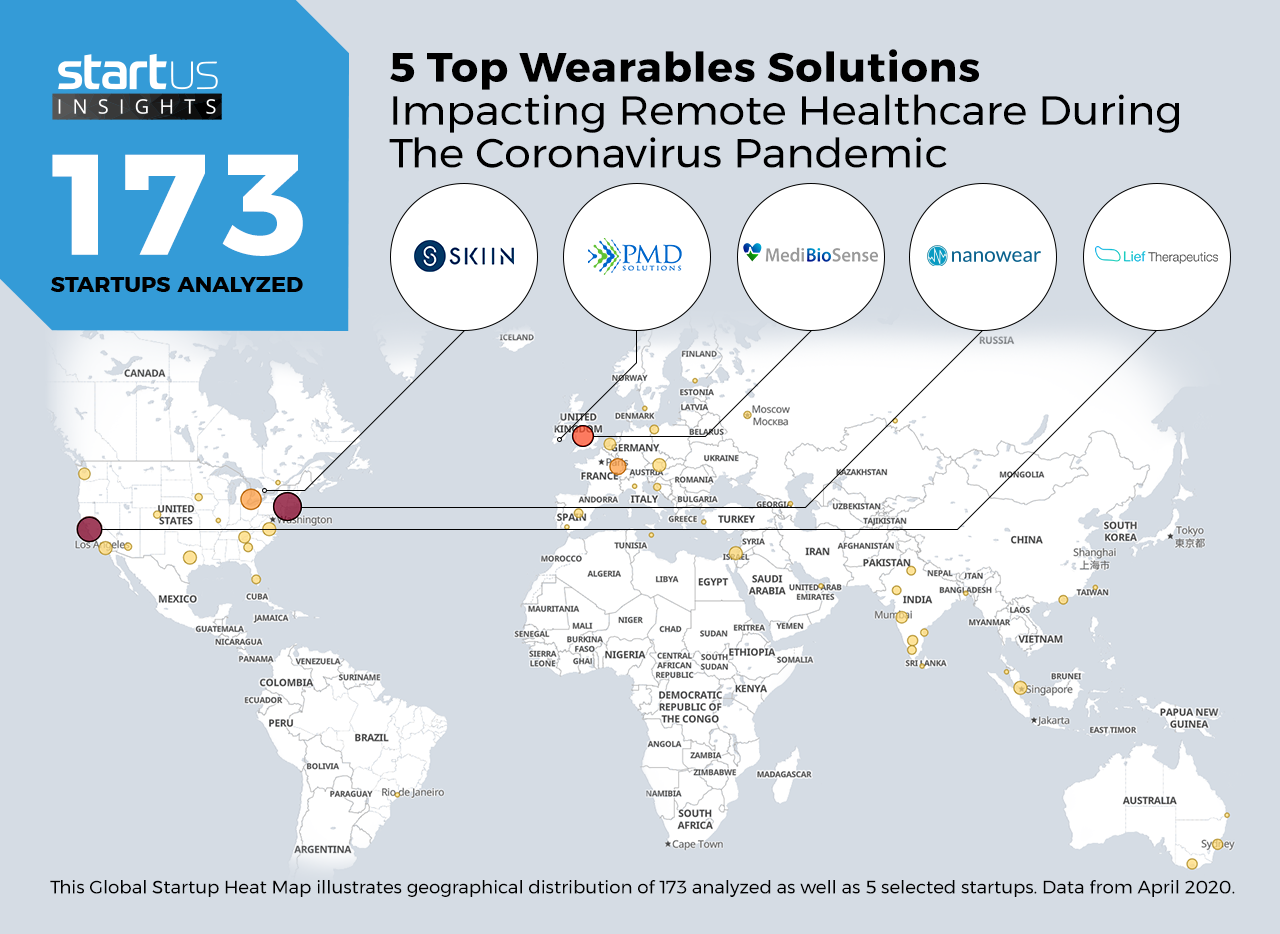Our Innovation Analysts recently looked into emerging technologies and up-and-coming startups working on telehealth solutions to mitigate the effects of the coronavirus pandemic. Here, we are taking a look at some of the most promising wearables solutions.
Heat Map: 5 Top Wearables Solutions
For our 5 top picks, we used a data-driven startup scouting approach to identify the most relevant solutions globally. The Global Startup Heat Map below highlights 5 interesting examples out of 173 relevant wearables solutions. Depending on your specific needs, your top picks might look entirely different.
Skiin – Smart Clothes
Because of the COVID-19 outbreak, the capacity of the healthcare systems globally is under the pressure of being exhausted. However, solutions that measure and monitor the health conditions of chronic, non-coronavirus patients are still needed. Smart clothes with built-in sensors enable the remote monitoring of patients’ vital signs and eliminate the need for hospital visits.
The Canadian company Skiin provides comfortable and washable smart clothes with built-in sensors for continuous vital sign monitoring. The company’s clothes track stress level, sleep quality, activity, temperature, and ECG levels (under FDA pre-submission process). Skiin’s cloth collection includes underwear, bras, shirts, and sleep masks.
PMD Solutions – Respiratory Monitoring
Wearable devices for respiratory monitoring enable healthcare providers to continuously track the breathing parameters of patients with coronavirus. These devices find use in both hospitals and at a patient’s home. In combination with innovative algorithms, these sensors help hospital staff to identify the earliest signs of patient deterioration and take required measures.
The Irish company PMD Solutions develops RespiraSense, a wearable sensor for respiratory monitoring. The software for monitoring respiratory rate allows medical professionals to retrieve a patient’s vital information. Additionally, the technology allows for timely interventions in the case of health deterioration due to conditions such as respiratory compromise, worsening pneumonia, or oncoming heart attacks.
MediBioSense – Real-Time Monitoring
In times such as the current Coronavirus pandemic, wearables solutions enable healthcare providers to remotely monitor the health parameters of patients with chronic diseases. Wearable patches, for example, help to protect patients with coronary heart disease, hypertension, and diabetes, who are at a higher risk of developing complications if infected with the novel coronavirus.
MediBioSense, a UK-based startup, works on wearable patches for real-time monitoring of a wide range of vital signs. These include parameters such as heart rate, ECG, temperature, respiration rate, and blood oxygen level (SpO2). The patch is a Class IIa medical device, certified both by the FDA and CE.
Nanowear – Cardiac Monitoring
Millions of people worldwide suffer from chronic diseases, including cardiovascular diseases, that require continuous monitoring of their health conditions. Due to the overburdened healthcare systems during the coronavirus pandemic and a higher risk of infections, patients with non-urgent cases are urged not to visit hospitals. Cloth-based nanosensors solve this challenge by enabling doctors to remotely monitor the cardiac health of their patients.
The US-based company Nanowear builds a cloth-based, nanotechnology-powered, FDA 510(k) cleared monitoring platform. The company’s nanosensors capture 15+ medical-grade biomarkers directly from the patient’s skin. Nanowear’s machine learning platform analyzes data from nanosensors to notify healthcare professionals in the case of a patient’s worsening heart condition.
Lief Therapeutics – Anxiety Reduction
The rapidly growing number of coronavirus cases, as well as self-isolation and social distancing that accompany the COVID-19 pandemic, are causing increased levels of stress and anxiety for many people. Wearable devices that track a user’s heart rate variability (HRV) play a role in anxiety reduction. These devices improve HRV, an important biomarker of stress, with special biofeedback exercises.
Lief Therapeutics, a US-American startup, designs a wearable device for mental health. Lief Rx is an FDA Class II device with a clinical-grade electrocardiogram sensor that monitors heart rate variability. The device also helps users to improve their HRV with biofeedback exercises to reduce anxiety and stress levels.
How To Flatten The Curve?
This is an unprecedented situation for many of us across the world. The SARS outbreak in the early 2000s claimed 774 lives. That toll was enough to drive research & development and easier healthcare solutions. The fact that several mobile health, e-health, remote health, hospital care, and diagnostics startups and emerging companies are able to respond during a real epidemic is encouraging. With thousands of deaths already, we expect to see numerous new companies offering technology-driven solutions to help doctors, nurses, other health workers, and the larger public.









